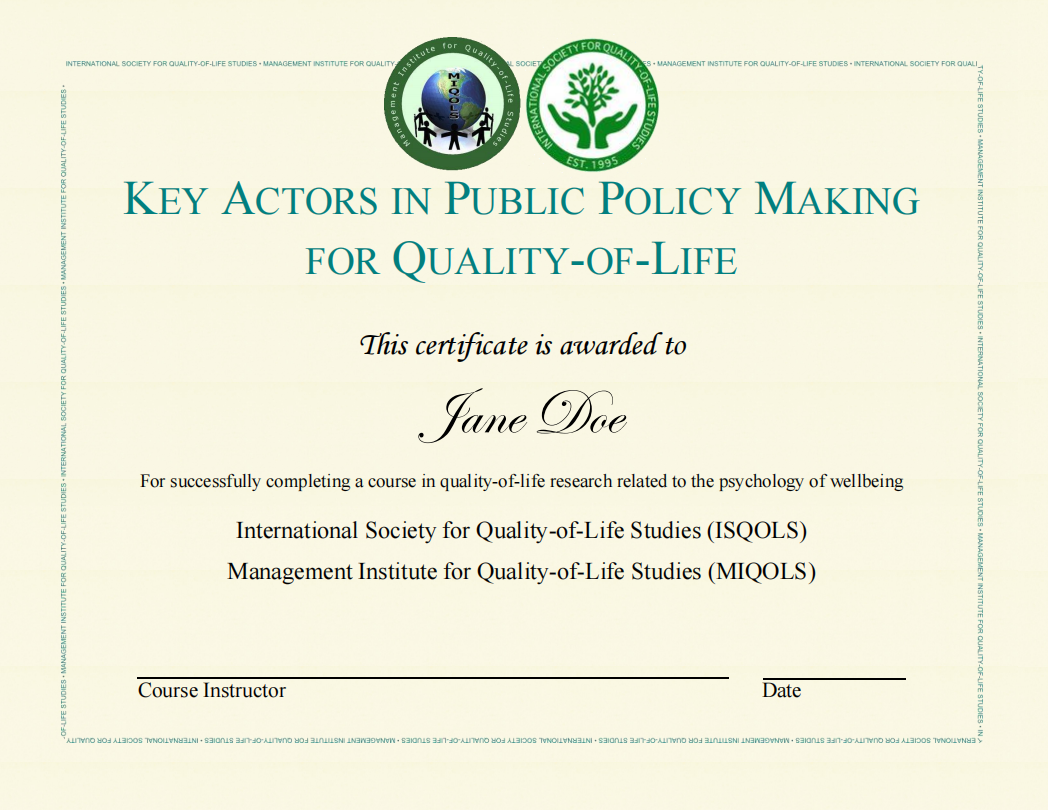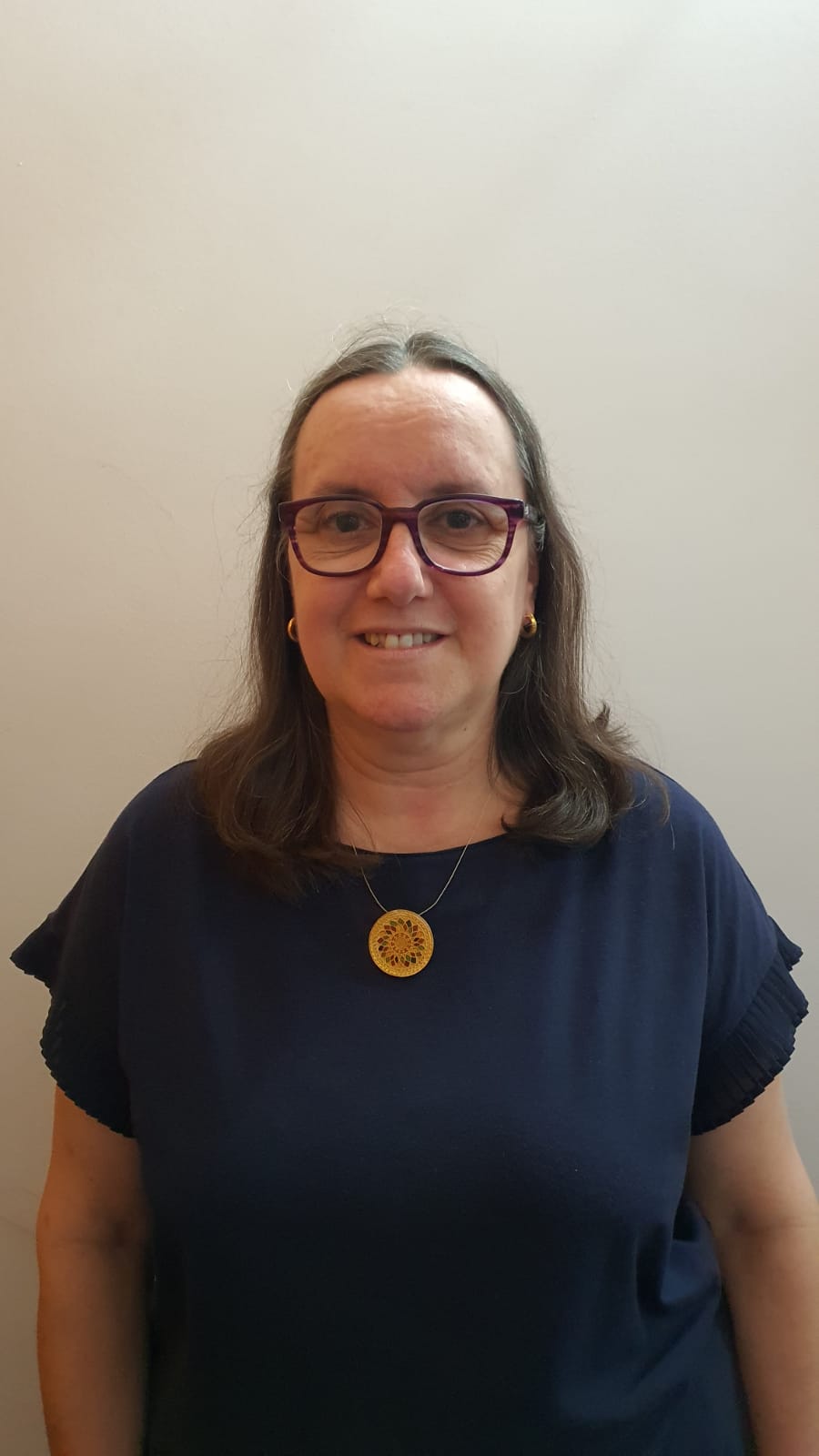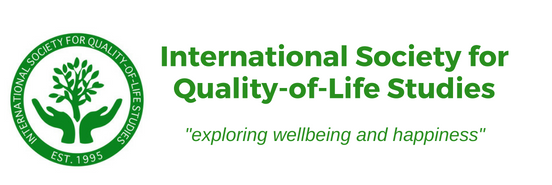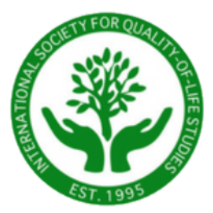Key Actors in Public Policy Making for Quality of LifeLearn how to transfer principles from quality-of-life research into the field of policy making to improve citizens' quality of life and receive certification from the International Society for Quality-of-Life Studies (ISQOLS), a globally-recognized academic and professional association, with its own publications, journals, conferences, and identity. Analyze the role of the actors in the process of using quality-of-life research for policymaking, identify the strengths and weaknesses, and propose various opportunities and solutions to enhance policymaking decisions. Download Brochure Sign Up Now
Learn how to transfer principles from quality-of-life research into the field of policy makingPolicymaking has veered away from its traditional role as an external activity provided by government toward a more modern role focusing on human rights and including other actors (besides government) involved in identifying problems and formulating solutions. Knowledge production has traditionally been generated at universities, and that the university structure has been historically based on scientific knowledge. Scientific research is used in public policy and underscores the need for both researchers and policy makers to collaborate to ensure that research findings are incorporated in the policymaking process. The course will identify obstacles and facilitators in the process of transmission of research findings to the policymaking apparatus. Download Brochure Sign Up NowThe certification course includes:
Course ModulesQuality of LifeTopics in this module include:
This certification program is aimed at:
Instructor Biographical SketchGraciela H. Tonon has a Ph.D. in Political Science (USAL, Argentina) and a master 's in political sciences. She did a Postdoctoral studies at the University of Firenze, Italy. She is also a social worker. She is Professor of Quality-of-Life: theory and methodology and Social Research Methodology and Director of the Research Center in Social Sciences of the University of Palermo, Argentina. She is also Professor of Community Social Work and Children at Risk and Director of the Social Institute of Social Sciences UNI-COM of the National University of Lomas de Zamora. She received the ISQOLS Distinguished Service Award for Contributing Substantially to a Better Understanding of Quality-of-Life Studies in 2016. She has published extensively in English and Spanish: 30 books, 98 book chapters and 66 scientific articles. She has directed 42 research projects, 83 researchers, 10 doctoral theses, 9 master's theses and 6 post-doctoral fellows. He has participated as a speaker and panelist in 383 Conferences: 222 internationally and 161 nationally. Her editorial responsibilities include Editor of the International Quality of Life Handbook Series, Springer-ISQOLS; Associate Editor of Applied Research in Quality of Life, Springer-ISQOLS. She is also the Director of the Journal of Social Sciences, of the University of Palermo, Argentina. She joined ISQOLS in 2000 and since then she has held different positions, currently being a member of the board of directors. She is a member of the National Olympic Committee of Argentina. Her fields of interest are Quality of Life, Research Methodology, Public Policy, Children and Community. 
Frequently Asked QuestionsThe program is self-paced and facilitated mostly one-on-one through personal communication with the instructor. The learning modules will be posted online with PowerPoint slides, videos, and reading assignments. These learning modules will be hosted by the Management Institute for Quality-of-Life Studies (MIQOLS) on behalf of the International Society for Quality-of-Life Studies (ISQOLS). Since there is no set timeline, the length of the course will vary based on the how quickly the student can master the material. Certification
Audit
No. However, to make the most out of the material provided in this course, it is recommended that the applicants have at least some background in social sciences and rudimentary knowledge of population statistics. ISQOLS can provide educational credit in terms of Continuing Education Units (CEUs) for this course. 1 CEU is equivalent to 10 contact hours. This course involves an estimated 15 contact hours in total. This translates into 1.5 CEUs. Those interested in receiving the CEUs should provide enough information to their own educational institution about the ISQOLS certification program and their own institution would determine if they would accept these CEUs. Many occupations require CEUs to stay licensed in their profession (counselors, life coaches, teachers, etc.). Those who wish to use the certification program for CEUs in meet continuing education requirements of their profession should contact their state/country licensing board and submit information about the course. This certification is provided by the International Society for Quality-of-Life Studies (ISQOLS), a global organization with a mission to promote and encourage research in the field of quality-of-life (QOL), happiness, and wellbeing studies. ISQOLS has members all throughout positioned in academic institutions as well as stakeholder groups, and are well-respected for their contributions to QoL. As such, an official certification would be beneficial to anyone who wants to learn how to transfer research findings in quality-of-life research into the domain of public policy. Upon completion of this course, participants will be able to:
This course is administered by Dr. Graciela H. Tonon. Learning modules will be posted online with PowerPoint slides, videos, and reading assignments |

